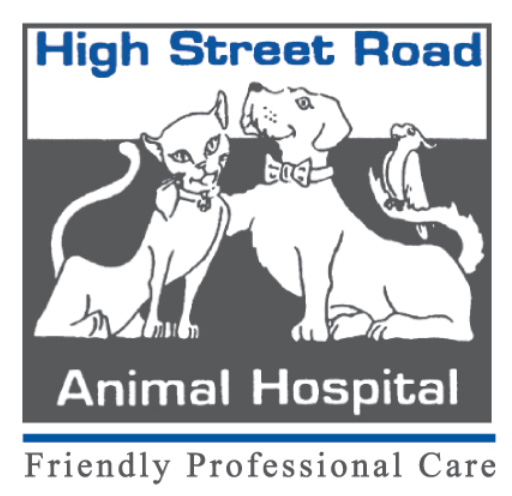Vaccination is a critical pet health activity and a key part of responsible pet care.
High Street Road Animal Hospital offers hassle-free vaccinations delivered by expert veterinarians. It’s easy to protect your pet by booking a time with our friendly team.
Our expert team can help you:
- Find out what vaccinations your pet will need.
- Schedule, administer, and record vaccinations for your pet.
- Monitor your pet’s reactions once vaccines have been administered.
- Answer any questions or concerns you have regarding vaccination and your pet.
- Ask our team about getting a vaccination schedule for your pet, it’s a great way to keep your pet protected and plan health care expenses.

Here at High Street Road Animal Hospital, we advise routine vaccination of all dogs and cats. This starts at 6-8 weeks of age for a course of puppy and kitten vaccinations and is followed by yearly boosters.
Vaccinations are very important as they enable us to prevent disease and prevention is always better than a cure. It is important to remember that many of the diseases that we vaccinate against are potentially fatal!
What are the risks of vaccinating my pets?
The risks are extremely low. Uncommonly an allergic reaction to the vaccination may cause swelling of the face, depression and pain at the injection site. Report these signs to us immediately as an antihistamine injection can be given to stop the allergic reaction.
In a small number of cases, a reaction at the site of the injection may occur as a firm swelling underneath the skin. This usually disappears after a month. Some animals may also become quiet and less interested in food for about 24 hours after the vaccine but this is only temporary.
The very small risks associated with vaccinations are far outweighed by the risk of disease which they effectively prevent.
Dog Vaccinations
Canine Distemper is a fatal viral disease which may cause signs of vomiting, diarrhoea, fever, conjunctivitis, muscle twitching and convulsions.
Infectious Canine Hepatitis causes liver disease. Signs include abdominal pain and depression. It is also a potentially fatal disease.
Parvovirus is a virus which causes severe gastroenteritis which can also be fatal. Signs of infection include severe depression, vomiting and diarrhoea containing blood.
Canine Cough is caused by a virus and a bacteria. Infected dogs develop a dry hacking cough which is very contagious to other dogs.
Puppies that are unvaccinated are at risk of developing severe disease and possibly death.
Our vaccination protocol for puppies is as follows:
- 6-8 weeks Protech C4 (Parvovirus, Distemper, Hepatitis and Canine Cough)
- 12-14 weeks Protech C5 (Parvovirus, Distemper, Hepatitis and Canine Cough)
- 16-18 weeks Protech C4 (As above)
After the initial course of puppy vaccinations, puppies should wait two weeks before being taken into public places such as the local park to ensure they have the maximum protection.
An annual booster vaccination is needed to maintain immunity in adult dogs. This visit always includes a full physical checkup by a Veterinarian.
What is Leptospirosis?
Leptospirosis is an illness caused by bacteria from the Leptospira family. These bacteria thrive in warm, damp environments and outbreaks are often linked to recent flooding. While Leptospirosis is extremely rare in Melbourne, there have been a few cases diagnosed in the city’s outskirts in recent years.
There is a vaccine available for certain strains of Leptospira. However, it is not part of the core vaccination schedule in Melbourne and is considered an optional vaccine.
For more information about Leptospirosis and how to prevent it in your dog, read more on our “What is Leptospirosis?” page.
Cat Vaccinations
All kittens require a course of kitten vaccinations to provide protection against Feline Upper Respiratory Disease (cat flu) and Feline enteritis.
Feline Upper Respiratory Disease is caused by a feline herpes virus +/- calicivirus. Signs of infection include sneezing, runny eyes, nasal discharge, coughing and mouth ulcers. Severely affected cats can suffer dehydration and pneumonia.
Feline Enteritis is also caused by a virus and results in severe, often fatal gastroenteritis. Kittens suffer vomiting, diarrhoea, dehydration and often death.
Kittens that are unvaccinated are at risk of developing severe disease and possibly death.
Our vaccination protocol for kittens is as follows:
- 6-8 weeks F3 (Feline Upper Respiratory Disease and Feline Enteritis)
- 12-14 weeks F3 (as above)
- 16-18 weeks F3 (as above)
An annual booster vaccination is needed to maintain immunity in adult cats. This visit always includes a full physical checkup by a Veterinarian.
Feline AIDS
Feline AIDS virus is reasonably common in the cat community with an estimated incidence of 26% of Victorian cats being infected. Although it is in the same family as the human HIV virus, it is a different virus and transmission to humans has never been recorded.
The virus is transmitted through the saliva of infected cats so fighting is the most common mode of transmission. Therefore any cat that goes outside should be vaccinated against the virus. Signs of the disease commonly include those associated with immunosuppression such as cat bite abscesses, dental disease, mouth infections, weight loss and poor coats. Eventually some cats can die from overwhelming infections.
A new vaccine is now available to protect against this disease. The vaccinations can be given to the kitten with the standard F3 vaccinations. Cats over 6 months of age need a blood test first to see if they are infected. All cats must also be microchipped before having the vaccination.
Rabbit Vaccinations
All rabbits must be vaccinated against the fatal disease rabbit calicivirus disease.
Rabbit calicivirus disease is caused by a virus that causes severe haemorrhagic disease and ultimately death in all rabbits that become infected. There is no known cure and it is always fatal.
In March 2017 a new strain of Rabbit Calicivirus (RHDV K5) will be released in Australia. The Australian Veterinary Association (AVA) has updated its recommendations regarding protecting pet rabbits from the various strains of calicivirus in Australia. Please note that the new vaccination protocol is “off label” which means it is not the protocol set out by the manufacturer of the vaccine. Also, there is no guarantee that the vaccine will be 100% protective against all strains of calicivirus in all rabbits.
Current Vaccination Recommendations:
- Baby Rabbits (kittens) 4,8,12 weeks of age then 6 monthly for life
- Adults (Not up to date with vaccine): 2 vaccinations 1 month apart, then 6 monthly for life
Please contact the clinic immediately if your rabbit has not been vaccinated in the past 6 months.
Other ways to protect your rabbit:
Calicivirus is spread by mosquitoes and flies. Therefore it is important to minimize your rabbit’s exposure to these by keeping them in well-protected hutches or indoors especially at dusk and dawn (when mosquitoes are most active).
Also restrict contact between your rabbit and wild rabbits – including any grass areas where wild rabbit are suspected to have been.
Ferret Vaccinations
Call us to book in!
Book your pet in for an appointment with one of our friendly, experienced vets today!
“Friendly and welcoming”
★★★★★
Very caring staff. It is very friendly and welcoming. Our dog loves visiting this place.
– Meaghan, 5-Star Google Review
Opening Hours
Mon to Fri: 7:30am-7:00pm
Sat: 8:30am-1pm
Sun: Closed
